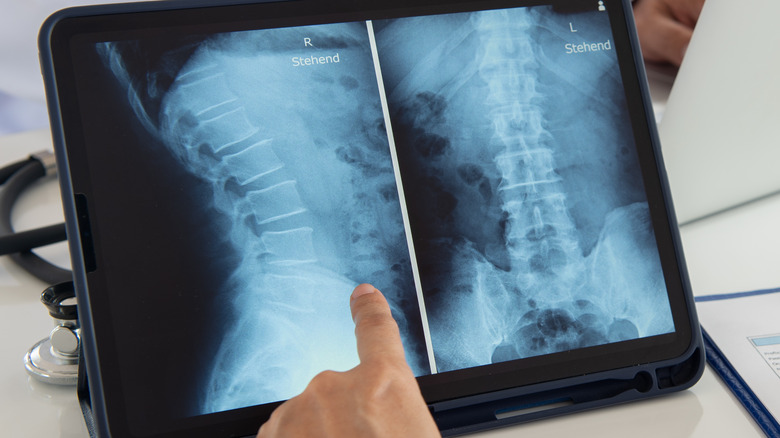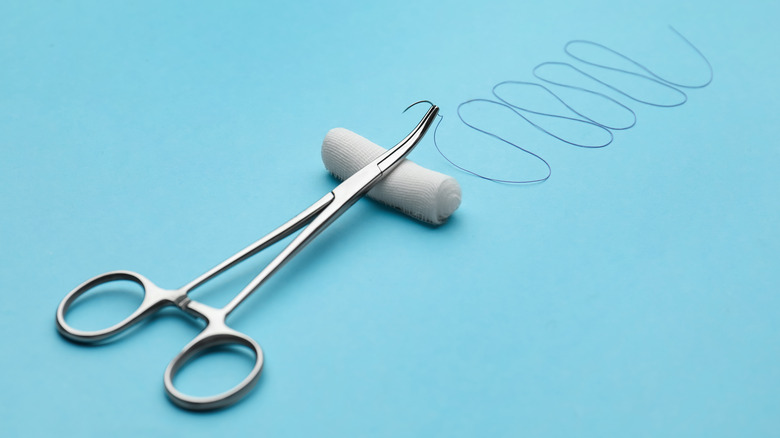Tips For Recovering From Back Surgery
It's easy to forget how much our backs do for us, supporting every movement throughout our lives. But when your back isn't feeling its best, it's safe to say you'll think of nothing else. Back issues and pain are seriously common and frequent causes of visits to the doctor in the United States (per the National Institutes of Health), and for certain individuals, surgery may be the best course of action to correct difficulties or problems with their back.
From spinal fusion or disk replacements to lumbar spine surgeries (which are performed approximately 500,000 times yearly, via research published in Frontiers in Pain Research), modern medicine has evolved to the point where a huge spectrum of conditions can be tackled safely via surgical procedures. Yet back surgery can still present complications, and in many cases may not be as successful as hoped, according to the American Society of Anesthesiologists.
So how do you create the best circumstances for yourself for your surgery to have the desired effect? Aside from your procedure going well, your recovery time is also crucial. Preparing adequately for it will help you get better faster and more comfortably. Let's take a look at our top tips for recovering from back surgery.
Before your surgery, ask your doctor some essential questions
Back surgery can be a daunting experience, and ensuring that you're comfortable and well informed going into it can not only make you feel more confident in your procedure, but will also assist you in recovering from it. The best person to talk to about this is your doctor.
Before you even agree to the surgery, consult with them about what the procedure entails, any potential complications or risks, and whether there are any alternative treatment options or therapies that can be explored beforehand (per Spine-Health). You may also want to question your surgeon about their experience with your specific procedure, any training or qualifications they have, and if you're unsure, whether you can get a second opinion.
If you do decide to go ahead with the surgery, you should ask your doctor about what your recovery could look like. Check with them about what kind of pain you might experience, how long you will have to stay in the hospital, and when you might be able to resume your routine activities like driving or running errands. It's also important to know how frequently you'll be seeing them after the surgery, and what kind of support you can access or expect.
You should know how long it'll take to recover
No two back surgeries are exactly the same, and the specific type of procedure that you go through may affect your recovery time significantly. It's worth bearing in mind, though, that when it comes to back surgeries, the recovery time is relatively long for a lot of treatments, so you should prepare yourself accordingly. On the shorter end of the spectrum, patients who have artificial disc replacement surgery could be fully recovered within several months, after undergoing a relatively short procedure, according to Lanman Spinal Neurosurgery. Discectomy, foraminotomy, and laminectomy procedures may also have you experiencing a shorter recovery time, with a few months generally required before you're back to full health.
Elsewhere, though, back surgery can take much longer to recover from. Spinal fusion surgery generally has a very long recovery time, with some procedures necessitating up to a year of recovery. Bear in mind, too, that during this recovery period, a huge number of your regular activities will be limited. It's worth discussing any concerns you have about the length of recovery time with your doctor. But crucially, if you do decide to proceed with surgery, remember that recovery can't, and shouldn't, be rushed, so follow any advice you get very carefully.
When you wake up after surgery, know what to expect
Your recovery begins from the moment you exit surgery, and this can be a disorienting experience for a lot of people. That's why knowing what to expect in those first few hours can set you off on the right foot.
The first thing to remember is that you won't be alone in this: You'll be monitored by a nurse as you wake up, says WebMD. In the very early stages of recovery, you'll be assisted by various machines, with an intravenous drip delivering pain medication and antibiotics, and electronic wraps placed around your limbs to keep your blood moving around your system. You may also have a catheter fitted, to clear away urine and waste.
As your anesthesia starts to fade, you might feel a little uncomfortable, and your pain may increase, according to the National Institutes of Health. If this is the case, speak with your nurse or doctor about how you can manage this. The effects of anesthesia can last for up to a few days on some occasions, with mental fog and difficulty thinking clearly affecting a fair number of older patients. If this is the case, the best thing to do is to wait it out — but make sure to ask your doctor if you're concerned about how long it'll last.
Be aware that it's normal to feel pain after surgery and beyond
Although surgical procedures continue to get more advanced, pain remains a common factor in recovery from them. While back surgery will likely relieve your back pain in the long run, it may still cause some additional pain in the short term — and it's important to prepare for this.
As you might expect, though, the pain that you'll feel post-surgery is primarily due to the wounds that are created during your procedure, according to PeerWell. This starts pretty much immediately after your anesthetic wears off, and will continue following your discharge from the hospital, as the site of trauma from the surgery inflames and begins to repair itself.
Luckily, this pain will start to wear off as your wound heals, and after around six weeks, you should feel a noticeable reduction in pain, both at the site of the surgery and in your back itself. During this recovery period, make sure that you're following your doctor's advice about pain relief to the letter, taking medication as instructed, and following an icing regime around the surgery site. It's also worth trying to reduce any stress or additional pressures you have during this period, as this can exacerbate pain. If your pain doesn't start to subside within a few weeks, contact your doctor.
You may have to stay in the hospital for a few days
Let's face it: Very few of us like being in hospitals for extended periods. You can have the most comfortable bed and the best healthcare in the world, but at the end of the day, we all just kinda want to be at home. After back surgery, though, it's useful to remember that you may have to stay in the hospital for a few days, during the first crucial steps of your recovery.
For spinal fusion surgeries, for example, you might expect to remain in the hospital for up to 4 days post-op, according to Spine-Health. While you're there, hospital staff will focus on your immediate rehabilitation, first by administering pain relief and monitoring your blood to ensure that everything's working as it should, and then by starting to reintroduce movement to get you up and walking. You might work with physical therapists who will help you learn to get out of bed and move around after surgery. They could provide you with support like back braces or walkers to assist you in your first few days.
It's a smart idea to bring some home comforts with you to the hospital, as well as some sturdy, easy-to-wear shoes. Lastly, when it's time to leave, make sure that you have someone who can drive you home.
Physical therapy after back surgery is normal (and recommended)
Back surgery can provide restorative results to your movement and your general life, but to get there, you'll need to take crucial steps in your recovery. And one vital component of recovery is physical therapy.
Physical therapy is designed to encourage better mobility and reduce the pain you experience while you recover, by introducing movement back into your muscles and enabling them to do the job of supporting your spine and back (per Pontchartrain Orthopaedics and Sports Medicine). Physical therapy can also assist in bringing your inflammation down post-surgery, to ease discomfort.
Your physical therapy should begin as soon as you're able to begin moving again, and your doctor and physical therapist will assist you in the first early steps. The therapist you're working with will likely examine how you move, as well as your spine and posture in sitting and standing positions. They'll also examine your strength and flexibility. Then, your therapist may prescribe specific exercises and stretches for you to complete during your recovery, along with other therapies like applying heat or massages. It's really important that you follow these as closely as possible, and do what your therapist tells you to do, for the full duration of time required.
What you eat after your surgery is essential
During recovery from back surgery, you need to make sure you're looking after your body as much as possible, and a huge part of that is your diet.
Focusing on a high-quality diet rich in key nutrients will give your back the best circumstances to heal under, as Spine Universe states. Protein should be the highest on your list of important dietary components, as it helps the body rebuild and heal post-operation. Leaning towards low-fat dairy products will provide you with a combo of protein and calcium, essential for bone recovery and strength, and certain meats are high in zinc, which keeps your immune system robust.
It's also incredibly important that you're eating enough. You'll need around double the calories that you'd typically consume to supply your body with the energy it needs to recover. You should spread these calories throughout the day, instead of eating them in large meals, as this gives your digestive system less of a hard time. And whatever you do, don't forget about your glasses of water: Hydration is paramount in assisting the body in healing, and will also stop you from getting constipated, either through lack of movement or through taking pain meds.
Normal things like sitting down might create problems
After back surgery, there will be a period of time in which your day-to-day activities are limited. And this can extend to the most innocuous of activities, like merely sitting down. Soft chairs with unsupported backs can be problematic when you're recovering from surgery, as your back will likely need to remain straight, says WebMD. To that end, seek out a chair that retains your posture, with armrests attached.
Additionally, you shouldn't be tempted to kick back and relax. While it might seem like an attractive prospect to while away a lazy afternoon in a chair after surgery, you need to stay mobile to give your back its best chance of recovery. If you are sitting down for an extended period, make sure that you're moving between positions periodically, and keep your legs moving so that the circulation in your lower half continues. Ideally, though, you'll want to be getting up and moving around every half an hour or so. When you're sitting down, ensure that you're not twisting in your chair, too — your back and spine need to stay straight.
Be aware of your sleeping habits
Anyone who's been through a surgical procedure will be aware of how tricky sleeping can be after one. And it's no different with back surgery, unfortunately. However, there are certain adjustments you can make to your sleeping habits to give you the most comfortable snooze possible.
Your sleeping position is key, and if possible, you should aim to sleep on your side or your back, says OrthoBethesda. Both of these positions will reduce pressure on your back, which can be further alleviated by putting a pillow under or between your knees. As much as possible, though, try to avoid sleeping on your belly, as this may create additional stress on your back and result in pain and discomfort.
There are also some general sleep principles that you should be following to make sure your sleep is as restful as can be (as sleep is, of course, paramount for recovery). Try to go to sleep and wake up at the same time every day, in a room that is peaceful, comfortable, and free of electronic devices. Also, as tempting as it can be, try to keep your naps to a minimum, as it'll only stop you from being able to sleep later on at night.
Keep an eye on your daily activity
Naturally, you'll want to make your recovery as seamless as possible, and one of the keys to this is being aware of which kind of activities you should and shouldn't be doing after back surgery.
Your physical therapist should inform you of what's safe and unsafe, but generally, you should avoid movements that bend or twist the spine until it's safe to do so, says Spine Universe. It's also important to avoid lifting any objects that are heavier than around five pounds. This might sound like a small amount, but nevertheless, don't resume any weight training or heavy lifting until after you recover.
What you should be doing, though, is staying active. Once you've recovered a little more, gentle exercise like walking short distances is essential to get your body back to its full health, as well as in aiding recovery. Higher-intensity exercises should be avoided until you're fully recovered, though. You should also continue with any exercises that your physical therapist instructs you to do to aid recovery and promote flexibility in your back.
Take care of your incisions very carefully
Your back surgery will have involved incisions made in your skin to access the bone or muscle that needed operating on, and taking care of these incisions is an important aspect of post-surgical care, to avoid infection (per the Cleveland Clinic). Make sure that you check your incisions daily with clean hands, looking for any overt redness or bleeding. Although they can be pretty itchy, it's super important to avoid scratching them, as this can irritate them further and risk opening them back up. Wear loose clothing as you heal, so that you're not having fabric rub against them throughout the day. If you're instructed to wear dressing, always throw away any used rolls or pads immediately.
Keeping an eye on signs of infection is also crucial. Alongside redness that spreads beyond the incision, infected wounds may also give off a pale discharge or feel particularly warm or hard around them, and can prompt other symptoms like a fever. You should keep your incisions clean as per your doctor's instructions, but if you're worried about infection, contact them immediately. You should also get in touch with your healthcare provider if your wound is bleeding, or if it's starting to open again.
Don't be afraid to ask for help
All major surgeries are challenging, and back surgery is no different. So there's no reason why you need to go through the recovery process alone.
While it's natural to not want to feel like a burden after surgery, the fact is that you may well need assistance in a range of areas, and asking for help can lighten your load. Simple tasks, like asking a loved one or friend if they can look after your pet, grab you some groceries, or do a school run for your kids while you're in the early stages of recovery, are definitely worth reaching out to them for, as Spokane Orthopedic Care points out. If you're trying to do too much too soon, you risk lengthening your recovery time or taking backward steps.
And don't forget about the emotional side of things. Recovering from surgery can be tough mentally, and if you need someone to talk to or lean on, don't be afraid to reach out. You can even just ask if a friend would be willing to chat on the phone or play a game online. Not only will it be fun, but this welcome distraction may also provide pain distraction and relief, as research published in the European Journal of Pain shows.
Pain management is essential
Back surgery can be incredibly painful, and knowing how to manage your pain will be crucial to your recovery and your comfort. Your doctor should give you a comprehensive pain management plan, and this should be followed to the letter. You will likely be prescribed pain medication, alongside guidance for ice therapy that can bring your swelling and pain down, as Spine-Health says. The medication you're placed on may be an opioid or maybe something more commonplace like an NSAID like ibuprofen or naproxen (per Spine Universe). It's vital that you stick to this medication; don't take others alongside it unless you've checked with your doctor first.
One thing to keep in mind is your substance use before surgery, too. "Try and be off of all the narcotic pain medication beforehand. It's hard to do, but that would be the goal," states orthopedic spine surgeon Rahul Shah via Spine Universe. Opioid users can develop a tolerance to pain medication, which may then affect the effectiveness of any medicine they're taking after surgery, especially in the early stages of recovery. Speak with your doctor if you have any concerns.
Know when to call your doctor
Sometimes, when you're discharged from the hospital after a back procedure, it can feel like you're on your own. But it's key to keep an eye on your recovery and to be aware of when you should get back in touch with your doctor.
Severe pain that doesn't fade during recovery should be reported immediately, and certain symptoms could also be signs that you'll need further medical attention, says MedlinePlus. Developing a fever or chills could be warning signs of infection, alongside any discoloration around or drainage from your surgical wound. It's also vital to watch out for signs that may not be directly located in your back, especially in your limbs. Any numbness or change in feeling in your legs and your arms, or pain in your calves, could potentially be a sign that you need to get back in touch with your surgeon. That's because this can indicate nerve injury or issues, especially if you've had lumbar decompression surgery (per the NHS). In the worst-case scenario, this could be a precursor to paralysis.















